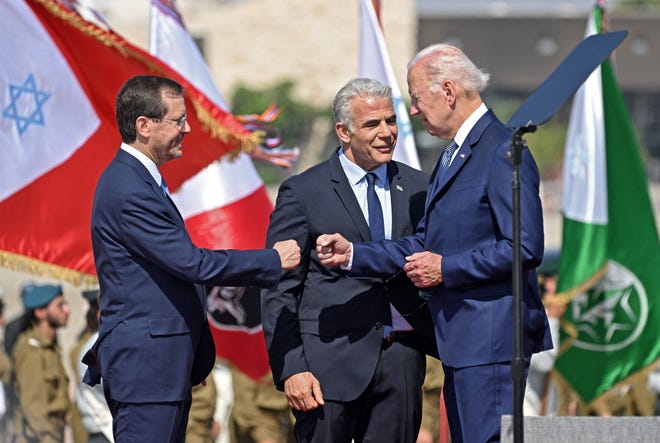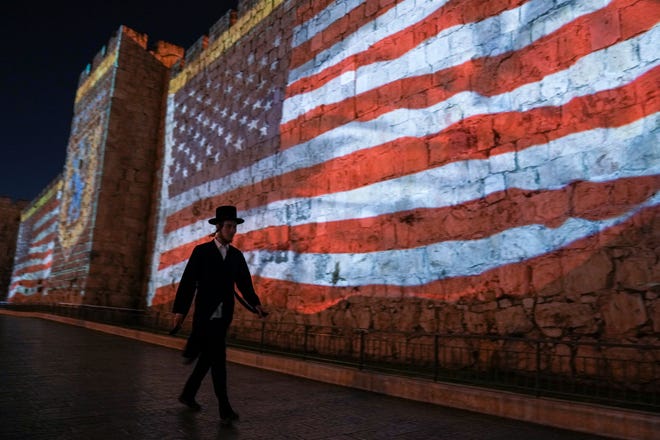- The U.S. and Israel plan to launch a partnership on emerging technologies Thursday..
- Biden is meeting with Yair Lapid, who recently became Israel’s acting prime minister.
- Biden is also meeting with former Prime Minister Benjamin Netanyahu.
JERUSALEM – President Joe Biden’s closed-door meetings with Israeli leaders on Thursday may delve into divisions over Iran and an independent Palestinian state, among other flashpoints.
But in public, it was all kumbaya between Biden and new Israeli Prime Minister Yair Lapid. With the prime minister at his side, Biden said their meeting was a “good beginning” of what’s going to be “a long, God-willing, relationship” between the two leaders.
“I think the vast majority of the American public, not just my administration, is completely devoted to (Israel’s) security,” Biden said.
The president acknowledged that a discussion took place about the possibility of an updated nuclear agreement with Iran during their private conversation.
“There will be no nuclear Iran. This is not only a threat to Israel, but to the world,” Biden said. “And we discussed some other issues we are going to keep to ourselves.”
But at a news conference later, Lapid lectured Biden on the issue. In prepared remarks, the Israeli leader pushed Biden to change course on Iran.
Lapid said no amount of words or diplomacy would stop Iran from further developing its nuclear program.
“The only way to stop them is to put a credible military threat on the table,” Lapid told Biden.
Biden said in his opening remarks that he would be maintaining his approach. “I continue to believe that diplomacy is the best way to achieve this outcome.”
The U.S. and Israel also issued a joint statement outlining areas of consensus. They launched a partnership on emerging technologies.
And Biden – who is making his 10th trip to Israel, though only his first as president – will receive Israel’s Presidential Medal of Honor to recognize his decades of support.

The latest:
- The tension: Biden’s relationship with Israel has been strained by his attempts to restart a 2015 deal with Iran that was meant to curb its nuclear activities, but which Israel viewed as not tough enough.
- The diffuser: The U.S. and Israel released a joint declaration that affirmed America’s “moral commitment” to U.S. security. The statement says the U.S. is “prepared to us all elements of its national power to ensure” that Iran never acquires a nuclear weapon.”
- Two-state solution: Biden said he would discuss his support for the creation of an independent Palestinian nation alongside Israel, “even though I know it’s not in the near term.” Rather than launch a new peace initiative, Biden will encourage both sides to “move closer towards a vision that works for both Israelis and for Palestinians, and for the region as a whole,” according to Jake Sullivan, Biden’s national security adviser.
- Joint ventures: The U.S. and Israel are launching a “high-level strategic dialogue” on technology. That’s in addition to a partnership on a laser-enabled missile defense system being developed that Biden was briefed on Wednesday.
- First up: Biden’s first meeting of the day was with Lapid, who recently became the acting prime minister of Israel after the collapse of a coalition government.
- New partnership: Biden also held talks with the leaders of Israel, India and the United Arab Emirates — a grouping the nations are referring to as the I2U2 that they say will work together on food security challenges and clean energy initiatives.
- Why it matters: Biden’s efforts to build stronger alliances with Indo-Pacific powers is a feature of his foreign policy. He met with Indian Prime Minister Narendra Modi in Europe in June at the Group of Seven economic summit, and in Tokyo in May, when the U.S. and a dozen other countries launched the Indo-Pacific Economic Framework. India is also a part of the Quad, an informal security alliance between Japan, the U.S. and Australia.
- Improving relations: It is Biden’s second conversation with UAE leader Mohammed bin Zayed since MBZ became president in May. Biden made a condolence call to the leader, whose nation is a top OPEC oil producer, following the death of MBZ’s half-brother in May.

What’s about to happen
Biden and Lapid will hold a joint news conference where they may be pressed on their differing views on Iran and help for the Palestinians. Both could also be asked about Palestinian American Shireen Abu Akleh, a journalist who was shot dead in May while reporting on an Israeli military operation in the occupied West Bank.
In what experts say is an attempt to avoid showing favoritism in the upcoming election, Biden is also meeting with former Prime Minister Benjamin Netanyahu, the leader of the opposition party who is vying to make a comeback.
Sullivan said the meeting reflects that America’s relationship with Israel is “not just about one person, one leader” but “about the state of Israel and about engaging across the political spectrum.”

Top takeaways
Despite their differences on Iran, Israelis still like Biden personally, says David Makovsky, a fellow at the Washington Institute for Near East Policy.
“Biden as an individual is very popular because they like the visceral politicians who wear their love of Israel on their sleeves,” Makovsky said. “He does.”
But Israelis know that progressives in the Democratic Party are pushing Biden to get tougher on Israel over its treatment of the Palestinians, according to Tamar Hermann, a senior research fellow at the Israel Democracy Institute. Plus, Hermann said, Biden succeeded former President Donald Trump, a very popular figure in Israel.
Trump withdrew from the Iran nuclear deal, recognized Jerusalem as the capital of Israel and helped normalize relations between Israel and several Arab nations.
What they are saying
- Shortly after arriving in Israel Wednesday, Biden called the connection between the Israeli people and the American people “bone deep.” “And generation after generation, that connection grows,” Biden said.
- Lapid said Biden’s relationship with Israel has “always been very personal.” He called Biden “one of the best friends Israel has ever known.”
- U.S. national security adviser Jake Sullivan, putting the energy security aspect of Biden’s trip into context, told reporters that the U.S. is in “constant contact” with oil producers in the Gulf and globally.
- “We’re also working, obviously, on domestic production as well. And those conversations will continue during this trip,” Sullivan said.
- Appearing virtually at the I2U2 summit, MBZ said that although the countries do not share geographic borders, they face “overlapping challenges,” including food and energy security, healthcare and climate change.
- Lapid added that “no single country, no matter how big or how rich, can deal with” these challenges alone.
- On the other hand, the Israeli PM said, “Groups that are too big may end up being ineffective. The quad is, in my view, the correct model.”
- Biden brought up Russia’s war on Ukraine and the pandemic as examples of issues that “require cooperation and coordination” between nations.
- “At every step we should be asking, `What can we achieve together?’” Biden said.
Want to know more? Here’s what you missed:
Avoiding handshakes:Could COVID help Biden avoid a controversial interaction in the Mideast?
‘Nobody has any hope’:Ahead of Biden’s Middle East trip, some Palestinians say he’s no different than Trump
US officials:Shot that killed Al-Jazeera journalist Shireen Abu Akleh likely fired from Israelis
A signal of ‘impunity’?:Biden’s trip to Middle East pits human rights against geopolitical reality




